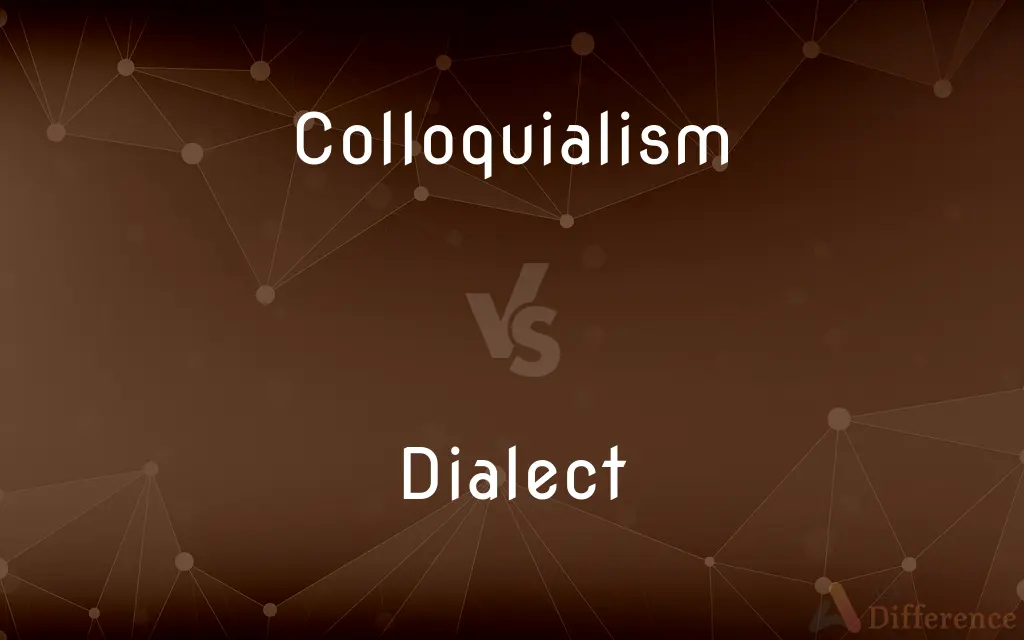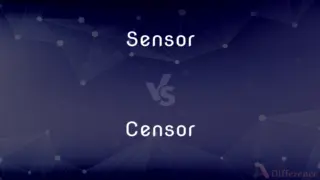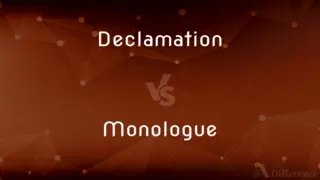Colloquialism vs. Dialect — What's the Difference?
By Tayyaba Rehman — Updated on November 4, 2023
Colloquialism is informal language used in conversation, while dialect is a regional language variation in vocabulary, pronunciation, and grammar.

Difference Between Colloquialism and Dialect
Table of Contents
ADVERTISEMENT
Key Differences
Colloquialism refers to the use of informal words or phrases that are often region-specific and used in everyday conversation. These expressions are typically not found in formal writing and can include slang, idioms, or figures of speech. Dialect, in contrast, encompasses the broader linguistic features of a specific region, class, or group, including grammar, vocabulary, and pronunciation. While colloquialisms can be part of a dialect, they are not the same; a dialect can exist without colloquialisms.
Colloquialisms bring color and authenticity to spoken language, making it relatable and vibrant. They are the informal terms that people use when they are speaking casually. Dialects go deeper, influencing not only word choice but also the sounds and structure of the language. They are a fundamental aspect of a group's linguistic identity and can be so distinct that they sometimes require translation.
When learning a new language, colloquialisms can be challenging to grasp due to their informal nature and cultural context. Dialects add an additional layer of complexity, as they can change the meaning of words and the structure of sentences. Mastery of a language requires an understanding of both its colloquialisms and its dialects.
Colloquialisms can evolve quickly, falling in and out of fashion within generations. They are often specific to age groups as well as regions. Dialects tend to change more slowly and can remain relatively stable over long periods. Both colloquialisms and dialects are important to sociolinguists, who study language in its social context.
While colloquialisms are often considered less formal and sometimes inappropriate in professional or academic settings, dialects do not carry the same connotation. A person's dialect is an intrinsic part of their cultural and geographic identity and is not necessarily informal or casual.
ADVERTISEMENT
Comparison Chart
Definition
Informal speech used in casual conversation.
A regional variation of a language.
Elements
Slang, idioms, phrases.
Vocabulary, grammar, pronunciation.
Formality
Informal and casual.
Can be formal or informal, depending on use.
Stability
Can change rapidly with trends.
Changes slowly, stable over time.
Usage
Specific to social settings or age groups.
Used by a geographic or social community.
Compare with Definitions
Colloquialism
Non-standard phrases used in everyday speech.
He's got cold feet about the wedding.
Dialect
Linguistic features typical of a social or regional group.
The Appalachian dialect has unique expressions.
Colloquialism
Vernacular speech often excluding formalities.
Let's hang out this weekend.
Dialect
A subdivision of a language with its own phonetic qualities.
Her dialect betrayed her Midwestern roots.
Colloquialism
Expressions used in ordinary or familiar conversation.
That movie was way out of left field.
Dialect
A regional variety of a language with distinct vocabulary.
In the Southern dialect, 'y'all' is a common pronoun.
Colloquialism
Informal language or slang.
I'm gonna ace this test.
Dialect
A form of a language spoken in a particular area.
His dialect had a strong Boston accent.
Colloquialism
Idiomatic language characteristic of casual dialogue.
She spilled the beans about the surprise party.
Dialect
The term dialect (from Latin dialectus, dialectos, from the Ancient Greek word διάλεκτος, diálektos 'discourse', from διά, diá 'through' and λέγω, légō 'I speak') can refer to either of two distinctly different types of linguistic phenomena: a variety of a language that is characteristic of a particular group of the language's speakers. Under this definition, the dialects or varieties of a particular language are closely related and are often mutually intelligible, especially if close to one another on the dialect continuum.
Colloquialism
Colloquialism or colloquial language is the linguistic style used for casual communication. It is the most common functional style of speech, the idiom normally employed in conversation and other informal contexts.
Dialect
A particular form of a language which is peculiar to a specific region or social group
The Lancashire dialect seemed like a foreign language
Colloquialism
A word or phrase that is not formal or literary and is used in ordinary or familiar conversation
The colloquialisms of the streets
Dialect
A regional or social variety of a language distinguished by pronunciation, grammar, or vocabulary, especially a variety of speech differing from the standard literary language or speech pattern of the culture in which it exists
Cockney is a dialect of English.
Colloquialism
Colloquial style or quality.
Dialect
A variety of language that with other varieties constitutes a single language of which no single variety is standard
The dialects of Ancient Greek.
Colloquialism
A colloquial expression.
Dialect
The language peculiar to the members of a group, especially in an occupation; jargon
The dialect of science.
Colloquialism
A colloquial word or phrase; a common spoken expression.
Dialect
The manner or style of expressing oneself in language or the arts.
Colloquialism
Colloquial style of speaking.
Dialect
A language considered as part of a larger family of languages or a linguistic branch. Not in scientific use
Spanish and French are Romance dialects.
Colloquialism
A colloquial expression, not employed in formal discourse or writing.
Dialect
A lect (often a regional or minority language) as part of a group or family of languages, especially if they are viewed as a single language, or if contrasted with a standardized idiom that is considered the 'true' form of the language (for example, Cantonese as contrasted with Mandarin Chinese or Bavarian as contrasted with Standard German).
Colloquialism
A colloquial expression; characteristic of spoken or written communication that seeks to imitate informal speech
Dialect
A variety of a language that is characteristic of a particular area, community, or social group, differing from other varieties of the same language in relatively minor ways as regards grammar, phonology, and lexicon.
Dialect
(pejorative) Language that is perceived as substandard or wrong.
Dialect
A language existing only in an oral or non-standardized form, especially a language spoken in a developing country or an isolated region.
Dialect
A variant of a non-standardized programming language.
Home computers in the 1980s had many incompatible dialects of BASIC.
Dialect
(ornithology) A variant form of the vocalizations of a bird species restricted to a certain area or population.
Dialect
Means or mode of expressing thoughts; language; tongue; form of speech.
This book is writ in such a dialectAs may the minds of listless men affect.Bunyan.The universal dialect of the world.
Dialect
The form of speech of a limited region or people, as distinguished from ether forms nearly related to it; a variety or subdivision of a language; speech characterized by local peculiarities or specific circumstances; as, the Ionic and Attic were dialects of Greece; the Yorkshire dialect; the dialect of the learned.
In the midst of this Babel of dialects there suddenly appeared a standard English language.
[Charles V.] could address his subjects from every quarter in their native dialect.
Dialect
The usage or vocabulary that is characteristic of a specific group of people;
The immigrants spoke an odd dialect of English
He has a strong German accent
Dialect
The language variety specific to a certain community.
The Cockney dialect is native to parts of London.
Common Curiosities
Are colloquialisms accepted in formal writing?
Colloquialisms are generally not used in formal writing.
Can a colloquialism be part of a dialect?
Yes, colloquialisms can be elements of a dialect.
Do dialects affect understanding between speakers of the same language?
Yes, strong dialects can sometimes hinder mutual understanding.
Is dialect determined by geography alone?
While often geographic, dialects can also be defined by social or ethnic groups.
Can a word be a colloquialism in one language and formal in another?
Yes, colloquialisms are language-specific and may vary in formality.
Are new colloquialisms frequently created?
Yes, colloquialisms can develop rapidly in response to cultural changes.
What is an example of colloquialism?
"Wanna" as a colloquial form of "want to" is a colloquialism.
Can dialects evolve into separate languages?
Over time and with significant changes, dialects can evolve into distinct languages.
Is it important to learn colloquialisms in a new language?
Yes, to fully understand and engage in casual conversation, it is important.
Do dialects have rules like standard languages do?
Yes, dialects have their own internal systems of rules.
Are colloquialisms used in literature?
Colloquialisms are used in literature to convey speech patterns and character.
Is a dialect considered incorrect or improper language?
No, a dialect is simply a variation of language and not incorrect.
Can colloquialisms become part of standard language?
Over time, some colloquialisms can be adopted into standard language.
Are there dictionaries for colloquialisms and dialects?
Yes, there are specialized dictionaries that include colloquialisms and dialects.
Do all speakers of a language use the same dialect?
No, dialect usage varies among speakers based on region and social factors.
Share Your Discovery

Previous Comparison
Sensor vs. Censor
Next Comparison
Declamation vs. MonologueAuthor Spotlight
Written by
Tayyaba RehmanTayyaba Rehman is a distinguished writer, currently serving as a primary contributor to askdifference.com. As a researcher in semantics and etymology, Tayyaba's passion for the complexity of languages and their distinctions has found a perfect home on the platform. Tayyaba delves into the intricacies of language, distinguishing between commonly confused words and phrases, thereby providing clarity for readers worldwide.















































